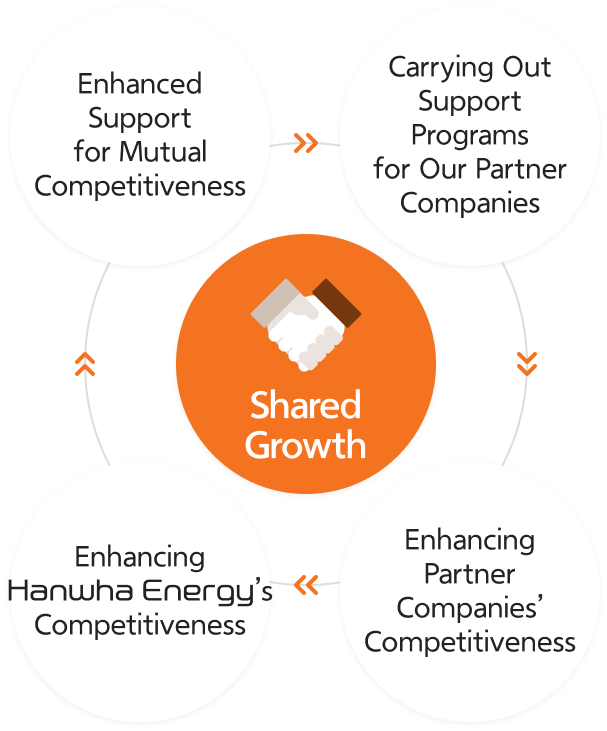Mutual Growth Management
Hanwha Energy Fosters Shared Growth Through Close
Collaboration With Its Partner Companies.
Hanwha Energy operates a variety of support programs to promote the co-prosperity of its partner companies. Beyond
strengthening mutual competitiveness, we practice shared growth that enables us to “go further together.”
Programs to Support Our Partner Companies
-
 Technical Assistance and Quality Enhancement
Technical Assistance and Quality EnhancementOn-Site Guidance for Partner Companies in Case of Quality Issues
Providing Technical Support via Quality Workshops
-
 Enhanced Payment Terms
Enhanced Payment TermsCash Payments and Shortened Note Maturities
Early Holiday Bonus Payments
-
 Support for Workforce, Education, and Training
Support for Workforce, Education, and TrainingConducting Online and Offline Training to Enhance Partner Employees’ Job Competencies


Guidelines for Partner Collaboration and
Co-Prosperity
Hanwha Energy is committed to faithfully implementing the Fair Trade and Shared Growth Agreement by adhering to the Fair Trade and Shared Growth Guidelines.
-
Guidelines for Establishing Collaborative Partnership Agreements
1. PurposeThese guidelines aim to ensure that small and medium-sized enterprises (hereinafter referred to as “Partners”) engaging in transactions with Hanwha Energy Co., Ltd. (hereinafter referred to as “Hanwha Energy”) can fairly reflect their interests in contract negotiations. The guidelines also seek to prevent Hanwha Energy from abusing its superior bargaining position in a manner that undermines the principle of contractual freedom. By providing clear rules for contract execution, these guidelines establish a framework for rational and fair business practices.
2. Contract Execution Infrastructure 2.1 Contracting MethodsHanwha Energy enters into contracts with its Partners based on factors such as the nature of the item, the number of potential counterparties, prior transaction experience, and contract value. Depending on these considerations, contracts may be executed through methods including direct contracts, open competitive bidding, limited competitive bidding, or selective (invited) competitive bidding.
3. Contract Execution 3.1 Compliance Requirements Hanwha Energy and its Partners shall adhere to the following requirements when executing contracts:3.1.1 Prior Written Agreement
As a general rule, contracts should be executed in writing prior to the commencement of work. At a minimum, a signed contract must be in place before starting delivery or other related work.
For frequent transactions, a master agreement should be provided first, followed by settlement statements for transactions conducted over a defined period.
If additional requests are made within a significantly shorter period than usual, prior written agreement on key terms is required.
3.1.2 Fair Pricing Based on Rational Calculation
Product prices shall be determined through negotiation based on a reasonable calculation method that takes into account quantity, quality, delivery schedule, payment terms, material costs, and an appropriate allocation of overhead and profit.
If circumstances arise that justify a price adjustment during the contract term, either party may request a price revision. In such cases, both parties shall mutually agree on a revised price within 30 days from the request date (with an optional extension of 30 days).
3.1.3 Clear Delivery Schedule
Hanwha Energy shall determine delivery schedules in full consultation with Partners, considering the characteristics of the product and standard industry practices.
Delivery schedules must be clearly established at the time of contract execution and any changes must be communicated explicitly.
3.1.4 Objective Inspection Standards
Objective, fair, and reasonable criteria and methods shall be established for the inspection of purchased products.
Except for justified reasons, inspection results must be communicated to the Partner within 10 days from the date of receipt of the product.
3.1.5 Reasonable Payment Terms
When commissioning manufacturing or other services to a Partner, payment shall be made within 90 days from the issuance date of the tax invoice.
If payment is made via promissory note, the note must be discountable at a legally recognized financial institution.
3.1.6 Fair Handling of Defective Products Discovered After Delivery
The parties shall agree on the return process based on the determination of the cause of the defect, the type of defect, and the corresponding allocation of responsibility.
3.1.7 Contract Termination or Cancellation
Termination or cancellation of the contract shall be defined by mutual agreement between Hanwha Energy and the Partner. Any occurrence of a termination or cancellation event must be communicated in writing without delay.
Even without a special agreement, the following events shall constitute grounds for contract termination or cancellation:
The other party receives a trading suspension order from a financial institution, or a business revocation or suspension from a supervisory authority.
The other party resolves to dissolve, transfer operations, or merge with another company, or if both parties acknowledge that it is impracticable to perform the obligations under the master or individual contract due to disasters or other reasons.3.2 Prohibited Practices in Contract Execution Hanwha Energy and its Partners shall refrain from the following practices during contract execution:3.2.1 Failure to Provide Written Documentation
Failing to issue a detailed supplementary contract or work order even when the scope of additional work is defined and the amount is significant.
In construction projects, failing to provide a revised contract or settlement statement despite verified changes or additions to the construction volume, due to disputes between the parties.
3.2.2 Unfair Determination of Subcontract Payments
Determining payment by discriminating against certain suppliers without legitimate reasons, or unilaterally setting a lower price without agreement from the supplier.
3.2.3 Requests for Proposal Submission or Development by Verbal Instruction
Canceling development after equipment completion or production preparation, or demanding a reduction of previously proposed prices when requested verbally.
3.2.4 Improper Management Interference
Interfering with the appointment or dismissal of personnel in the partner company.
Forcing the partner company to deploy on-site workers contrary to their intentions, even when construction is proceeding normally.
3.2.5 Failure to Adjust Subcontract Payments in Response to Raw Material Price Changes
Failing to respond to a request for consultation or failing to conduct meaningful discussions after notifying the initiation of a consultation.
Repeatedly proposing prices that cannot be reasonably accepted by the partner without objective justification for price adjustment.4. Faithful Contract Performance in Accordance with Contract Terms and Applicable Laws 4.1 Compliance Obligations for Contract Performance4.1.1 Compliance with Civil and Related Laws
Both Hanwha Energy and its partners shall adhere to the principle of good faith, the Subcontracting Act, the Fair Trade Act, and other relevant laws. Any disputes shall be resolved based on written documentation.
4.1.2 Prior Agreement and Written Documentation for Price Reduction
In cases of price reduction due to falling raw material costs or increased volumes, a reasonable basis for the price adjustment must be presented and agreed upon in writing.
4.1.3 Payment Adjustment for Contract Changes
Additional costs arising from changes in specifications or other contract modifications must be appropriately compensated.4.2 Prohibited Practices in Contract Performance4.2.1 Unjustified Refusal of Receipt
Refusing to accept delivery from a partner company without valid reasons, such as insufficient storage space, is prohibited.
4.2.2 Unjustified Returns
Returning goods already received due to reasons such as client complaints, foreign importers’ requests, or poor sales performance is prohibited.
4.2.3 Unjustified Payment Reduction
Even when a price reduction agreement has been reached, retroactively applying it to previously commissioned work without agreement is prohibited.
4.2.4 Unreasonable Demand for Economic Benefits
Demanding sponsorships, incentives, or other economic benefits for reasons such as revenue or operational difficulties is prohibited.
4.2.5 Prohibition of Forced Purchases
It is prohibited to compel partner companies to purchase or use products or services from Hanwha Energy, its affiliates, or any specific company without legitimate reason.
4.2.6 Prohibition of Unjust Payment Claims for Purchases
Partner companies shall not be forced to buy necessary materials for delivery from Hanwha Energy or to use proprietary equipment without a valid reason.
4.2.7 Prohibition of Compulsory Provision of Technical Data
Partner companies must not be compelled, without legitimate reason, to provide technical data to Hanwha Energy or any third party.
It is prohibited to exploit technical data obtained from partner companies for the benefit of Hanwha Energy or any third party. -
Guidelines for Selection and Management of Partner Companies for Shared Growth
1. PurposeThe purpose of these guidelines is to establish general principles to enhance the transparency and fairness of Hanwha Energy Co., Ltd.’s (“Hanwha Energy”) partner company selection and management processes.
2. Selection and Management of Partner Companies 2.1 Clarity and Specificity of Selection CriteriaHanwha Energy shall define the criteria for selecting partner companies in a clear and specific manner to prevent arbitrary interpretation.
2.2 Fairness of Selection Criteria and Procedures2.2.1 Relevance: Selection criteria must be relevant to the scope of the entrusted transaction, and the weighting of each criterion should be appropriately allocated.
2.2.2 Non-Discrimination: No unjustified differentiation shall be made between existing registered companies and newly registered companies in applying the selection criteria.2.3 Equal Opportunity to Initiate TransactionsOnce a partner company is selected and registered, it shall not be unfairly restricted or discriminated against regarding opportunities to participate in bids or other transaction initiation activities.
2.4 Selection, Operation, and Deregistration of Partner CompaniesThe selection, management, and potential deregistration of partner companies shall be carried out based on the existing procedures for subcontractor selection and evaluation as well as partner company selection and assessment guidelines.